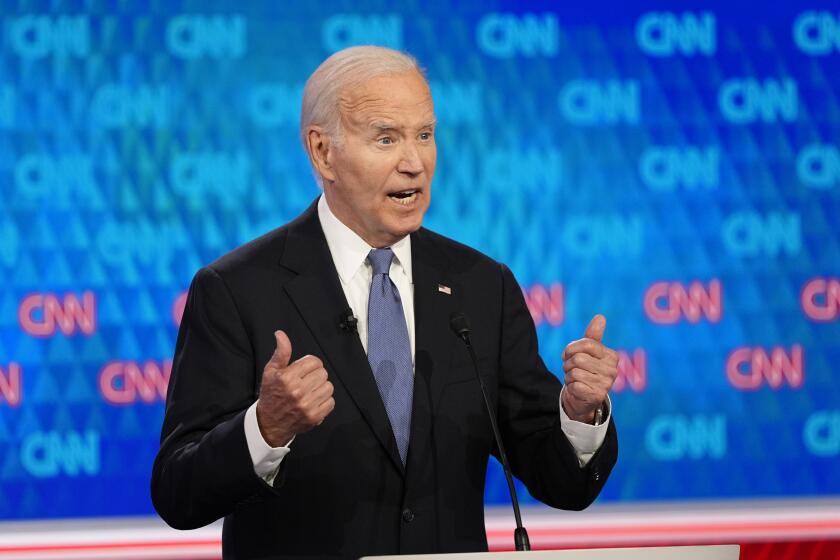Matsushita to Buy MCA--$6.5 Billion : Entertainment: The deal for the Hollywood conglomerate is the largest takeover of a U.S. company by a Japanese firm. The price is lower than expected.
After nearly four months of secret negotiations, Hollywood’s MCA Inc. on Monday signed an agreement to be bought by Japan’s Matsushita Electric Industrial Co. for about $6.59 billion in cash and securities.
MCA President Sidney J. Sheinberg said his company’s need for a “strategic alliance,” combined with pessimism about the economic future, led it to accept Matsushita’s lower-than-expected offer of $66 per share in cash.
In addition, MCA shareholders will receive stock in a newly created spinoff company that will own MCA’s New York-area TV station. Company officers have privately valued the spinoff at about $5 a share, raising the total payout to $71, though some Wall Street traders have said the new shares might trade as low as $3.
MCA--founded in 1924 as a booking agent for jazz bands and now the fourth-largest entertainment company in the United States--is the most diversified of the Hollywood entertainment conglomerates.
Among its properties are Universal Pictures, Universal Studios Tour in Universal City and a similar theme park in Florida, a publishing house, record labels and interests in cable television and movie theaters.
The firm has grown to become a colossus of films (“E.T.--The Extra-Terrestrial,” “Jaws,” “Back to the Future” series), records (Reba McEntire, Elton John, Guns N’ Roses, Bobby Brown, George Strait) and television (“Murder, She Wrote,” “Major Dad”). Its Florida and California theme parks are exceeded only by Disney’s.
The deal is the largest takeover of an American company by a Japanese firm.
MCA, with about 17,000 employees, earned $192 million last year on revenues of $3.4 billion. Profitability has been erratic over the years, but the company has never been in financial trouble.
Matsushita, founded in 1918 by Konosuke Matsushita, who died last year at 94, is Japan’s largest electronics company and is familiar to American consumers through such brand names as Panasonic, Technics and Quasar. It had $38 billion in sales in its latest fiscal year and earned $1.5 billion.
Among the world’s top 20 corporations with more than 189,000 employees, Matsushita is following the lead of Japanese rival Sony Corp. in buying access to movies and recordings that can be played on its electronics products. Sony bought Columbia Pictures Entertainment last year for $3.4 billion.
Under the agreement, MCA left the door open to a higher bid by guaranteeing Matsushita up to $125 million in fees and expenses if the Hollywood company accepts any unsolicited offer from another company before the current deal closes.
One major shareholder, who declined to be identified, said that he did not regard such a bid likely.
“(MCA Chairman) Lew (Wasserman) would have dragged his feet if there had been a hint from the GEs or the Capital Cities of the world. But nobody was forthcoming.”
MCA stock closed Monday at $65.125 a share, down 25 cents, on the New York Stock Exchange.
While most shareholders will receive cash from Matsushita, Wasserman, 77, will be paid a special issue of preferred stock for his 5 million of MCA’s 92.8 million shares outstanding. The preferred stock will enable Wasserman to avoid the huge tax bill that might have accompanied a cash sale.
Breaking silence after months of closed-door negotiations, Sheinberg said in a telephone interview Monday that MCA had sought the alliance with Matsushita, a consumer electronics giant, to assure its own growth. “We felt in the world of the future, we were going to need more resources financially and otherwise than we felt we had or could get. We felt we had to be part of something more diversified,” Sheinberg said.
In similar moves, there was Sony’s acquisition of Columbia and Time Inc. acquired Warner Communications to become Time Warner Inc.
MCA had been seeking such a partner for years, but had difficulty finding a company that could afford an acquisition that Wasserman and others once believed would command $90 a share or more.
Sheinberg defended the purchase price as not only “fair, but something we could recommend vigorously.” He added: “Would we have liked to receive more? Sure. If I told you no, you would say I’m the biggest jerk you’ve ever run into.”
Some shareholders complained privately that MCA could have commanded more by waiting for a better economic climate. Wasserman’s age and dim view of the world economy apparently militated against that. Sheinberg said MCA officers were “not optimistic” about the economy and doubted whether a change in the federal “financial interest and syndication” rules--which bar TV network owners such as General Electric Co. from owning studios--would have prompted a better bid.
In Washington, Federal Communications Commission Chairman Alfred C. Sikes issued a brief statement Monday predicting that the Matsushita-MCA combination “will almost certainly affect” the debate over a change in the rules. Network owners have argued that they must be allowed to produce their own shows in order to compete effectively with foreign-owned media conglomerates.
Matsushita President Akio Tanii, addressing a Tokyo press conference from Osaka via a giant video screen, said MCA officers would be largely free to run their company under terms of the agreement. Tanii grew visibly tense at some tough questions from Western reporters.
Asked what Matsushita would do if MCA proposed to produce a “Japan-bashing” film, or one critical of the late Emperor Hirohito’s role in World War II, Tanii said: “I didn’t dream there would be a question like that. . . . Something like that (film) shouldn’t emerge. . . . Filmmakers must create films that are inspirational, that will be enjoyable for everybody.”
Asked about U.S. criticism of Matsushita’s participation in the Arab-led boycott of Israel, Tanii said simply: “We are fair to all. . . . We don’t have any experience of having treated anybody or any country differently.” Wasserman, Sheinberg and Matsushita negotiator Michael Ovitz all have been major backers of Jewish and Israeli causes, and it is illegal for any U.S. company to participate in the boycott.
In a statement, World Jewish Congress President Edgar Bronfman called Matsushita a “slavish adherent” to the boycott. “The Jewish community is deeply concerned over Matsushita’s discriminatory policies . . . which are not only reprehensible on ethical grounds but contradict the bedrock principle of free and open trade between nations.”
Sheinberg said both he and Wasserman had signed new five-year contracts to remain in their positions, but he declined to discuss sharply conflicting reports about his own intentions.
One individual with knowledge of the marathon Sunday board session at which the acquisition agreement was hammered out said Sheinberg explicitly declared his intention to leave MCA when Wasserman does, rather than moving into the chief executive’s position.
“His belief is that it’s time for a younger man to move up. He would have to change his personal philosophy to stay. He sees himself as Lew’s partner,” the individual said of Sheinberg, who is 54.
David Geffen, an MCA executive and one of the company’s biggest shareholders, disputed that claim. “That’s absolutely not true. . . . The exact reverse is true. His contract guarantees (the CEO job) to him,” said Geffen, who will receive about $710 million from the sale. He said Sheinberg would become chief executive officer automatically if for any reason Wasserman vacated the job.
In a letter distributed at MCA’s Universal City headquarters Monday, Wasserman and Sheinberg assured employees that they did not expect any personnel or policy changes from the sale. Sheinberg said executives other than himself and Wasserman did not get contractual guarantees as part of the deal.
Individuals close to Ovitz, the Creative Artists Agency chairman who served as Matsushita’s chief consultant, said the agent will not play a role in managing MCA.
Matsushita will appoint new directors to MCA’s board so that it controls a majority of the votes.
Reportedly exhausted after more than a week of intense bargaining, Wasserman flew back to Los Angeles from New York on Monday after conducting only a handful of brief press interviews. Asked about the relatively modest acquisition price, he told Reuters news service: “(The deal) could have been derailed along the way. You reach a point where you get the highest figure you’re going to obtain.”
The accord was signed by Wasserman and Matsushita executive Masahiko Hirata at 9:30 a.m. EST during a brief ceremony at Matsushita’s New York law firm. MCA’s board had met until about midnight the night before, as it debated the acquisition and apparently conducted last-minute negotiations with Matsushita by telephone from the board room.
Under the agreement, Matsushita will launch a tender offer for MCA’s shares by Nov. 30 and expects to consummate the offer by early January. The companies said they intend to sell Yosemite Park & Curry Co., through which MCA operates tourist facilities in Yosemite National Park, to an American buyer within 12 months.
Federal officials and others had objected to the possibility that a foreign company might profit from the park. Matsushita and MCA said the Curry Co. would be held in escrow until it is sold, and any profits from the operation would be donated to the National Park Foundation.
The exact value of the deal remains difficult to assess because of sharp disagreements over the likely value of stock in the spinoff that will own MCA’s WWOR-TV station, which broadcasts in the lucrative New York market. MCA executives have assigned it a share value of about $5, reflecting total value of about $500 million.
Several investors said they expected the so-called “stub” of stock in the spinoff to trade for less on the open market.
Times staff writers Alan Citron and John Lippman contributed to this story. Michael Cieply reported from Los Angeles and Leslie Helm from Tokyo.
MATSUSHITA-MCA DEAL AT A GLANCE
Here are the principal terms of the agreement:
Price: $6.59 billion in cash and securities. Holders of MCA Inc.’s 92.8 million shares will receive $66 per share in cash, plus a share worth about $5 in WWOR-TV, a New York-area TV station that will be spun off to MCA stockholders because broadcasting licenses cannot be owned by foreign companies. For tax purposes, Lew R. Wasserman, MCA chairman and chief executive, will receive no cash, but will instead exchange his 5 million MCA shares for preferred shares of a new Matsushita subsidiary.
Management: MCA will continue to operate under its name and existing management. Matsushita will name a new majority slate to MCA’s board of directors.
Yosemite: Matsushita has agreed to sell the national park concession operated by the Yosemite Park & Curry Co. within a year. In the interim, profits will go into a trust for the benefit of Yosemite National Park. Matsushita will play no role in park management.
Timing: Matsushita will launch a tender offer for MCA’s shares by Nov. 30, and expects to consummate the offer by early January.
More to Read
The biggest entertainment stories
Get our big stories about Hollywood, film, television, music, arts, culture and more right in your inbox as soon as they publish.
You may occasionally receive promotional content from the Los Angeles Times.






